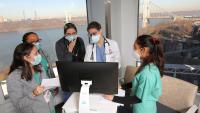Lung Transplantation
About Lung Transplantation
Make an Appointment
Our experienced team is here to help you learn more about our program, to schedule an appointment, or to help with a referral.

What Is a Lung Transplant?
Lung Transplantation is a complex surgical procedure that removes a person's damaged lung and replaces it with a healthier lung from a donor. A lung transplant is an option when other therapies are not effective.
What Conditions Can a Lung Transplant Treat?
Lung transplantation is considered for patients with any form of advanced lung disease, including:
- Interstitial and fibrotic lung diseases
- Chronic obstructive lung disease/emphysema
- Cystic fibrosis and bronchiectasis
- Pulmonary hypertension and other pulmonary vascular diseases
- Sarcoidosis
- All other less common lung diseases
What Are the Risks of a Lung Transplant?
Rejection is a significant risk for all transplanted organs. Because the transplanted lung is a foreign substance, the body's immune system reacts to it as a threat and attacks it. Specialized medicines can stop the immune system from attacking the new lung. These medicines must be taken for the rest of the patient's life and can have many serious side effects.
Lung transplantation is a complex surgery, and all surgeries carry some risks. These include:
- Bleeding
- Blood clots
- Infection
- Severe pulmonary edema (fluid in the lung)
How Are Candidates Selected for Lung Transplantation?
Transplants are a complex procedure and place significant stress on your body. It's essential to evaluate your overall health to determine if a transplant is a viable option. A transplant team will meet with you to explain how transplantation would impact you and your family. This team will include a pulmonologist, surgeon, coordinator, psychiatrist, social worker, and financial counselor to address any questions you may have. You will also undergo a number of diagnostic procedures, including:
- Chest x-ray/CT scan
- Quantitative ventilation-perfusion lung scan
- Cardiac testing
- Pulmonary Function Tests (PFT)
- Arterial blood gas
- Exercise tests
- Bone density test
- Blood, tissue, and urine testing
- Antibody testing
- PPD and anergy testing for tuberculosis
- Health care Maintenace testing (including eye exam, mammogram, dental exam, etc.)
The evaluation phase varies between 2 to 8 weeks and is based on the severity of the patient's lung disease. Urgent evaluations can be provided as an inpatient within days. Once testing is complete, the team members and clinicians will determine if you are a candidate for transplantation.
It's important to remember that transplantation is not the right choice for everyone. If you are not selected as a candidate, the team will recommend other treatment options.
Learn More About the Evaluation Process Here at Columbia
What Happens Once I Am Selected as a Candidate for Transplant?
Transplant candidates are placed on the organ recipient waiting list of the United Network for Organ Sharing (UNOS). The supply of donor organs is limited, so UNOS was created to ensure all candidates have a fair chance to receive the transplant they need.
How Long Will I Need To Wait for a Donor Organ?
Wait times vary, but most patients in the New York City area can expect to wait about 7 months for their donor organ to become available.
What Should I Do While I Wait for My Transplant Organ?
You must follow the care plan recreated by your transplant team to ensure that you are ready if a donor organ becomes available. That means adhering to rehabilitation and nutritional guidelines, and making sure you are up to date with your immunizations to reduce the risk of infection. You should also remain close enough to Columbia University Irving Medical Center/NewYork-Presbyterian to reach the hospital within a few hours of being notified that your new organ is available.
Learn More About Preparing for Your Transplant
How Long Is the Operation?
Transplantation surgery can take six to eight hours, depending on whether it is a single or double lung transplantation. Complications may require additional time.
Learn More About the Operation
Are Both Lungs Replaced During Transplantation?
Depending on the type of illness or damage, one or both lungs may need replacement. Factors like the patient's age will also play a role in the decision.
What Happens After Transplantation Surgery?
Here at Columbia, you will be closely observed following transplant surgery in the Cardiothoracic Intensive Care Unit (CTICU). This special intensive care unit is staffed by critical care specialists who have expertise in monitoring transplantation. You will then be transferred to a transplant unit with dedicated nurses trained to care for lung transplant patients. While in the transplant unit, you will begin receiving physical and pulmonary therapy.
You will begin taking your medications immediately after surgery. These will include:
- Immunosuppressants to reduce the risk of organ rejection
- Antibacterial, antifungal and antiviral medications
- Vitamin and mineral supplements
What Lifestyle Changes Will I Need To Make After Receiving a Lung Transplant?
A lung transplant has significant impact on many areas of your life. Your transplant team will work with you to make sure you understand what you need to do, what to avoid, and how to take care of yourself post-transplant. Recommendations include:
- Adhere to the follow-up clinic visit and testing chedule
- Take all medications on time and accordingly to the provided guidelines
- Monitor for signs of organ rejection
- Exercise according to your physical therapy plan
- Take precautions to avoid infection
- Maintain proper diet and follow the nutritional guidelines outlined by your transplant team
How Can I Request an Evaluation?
Here at Columbia, potential candidates are typically referred by a physician for assessment, but you may also contact the program directly. Email us at lungtransplant@nyp.org to request an evaluation.

